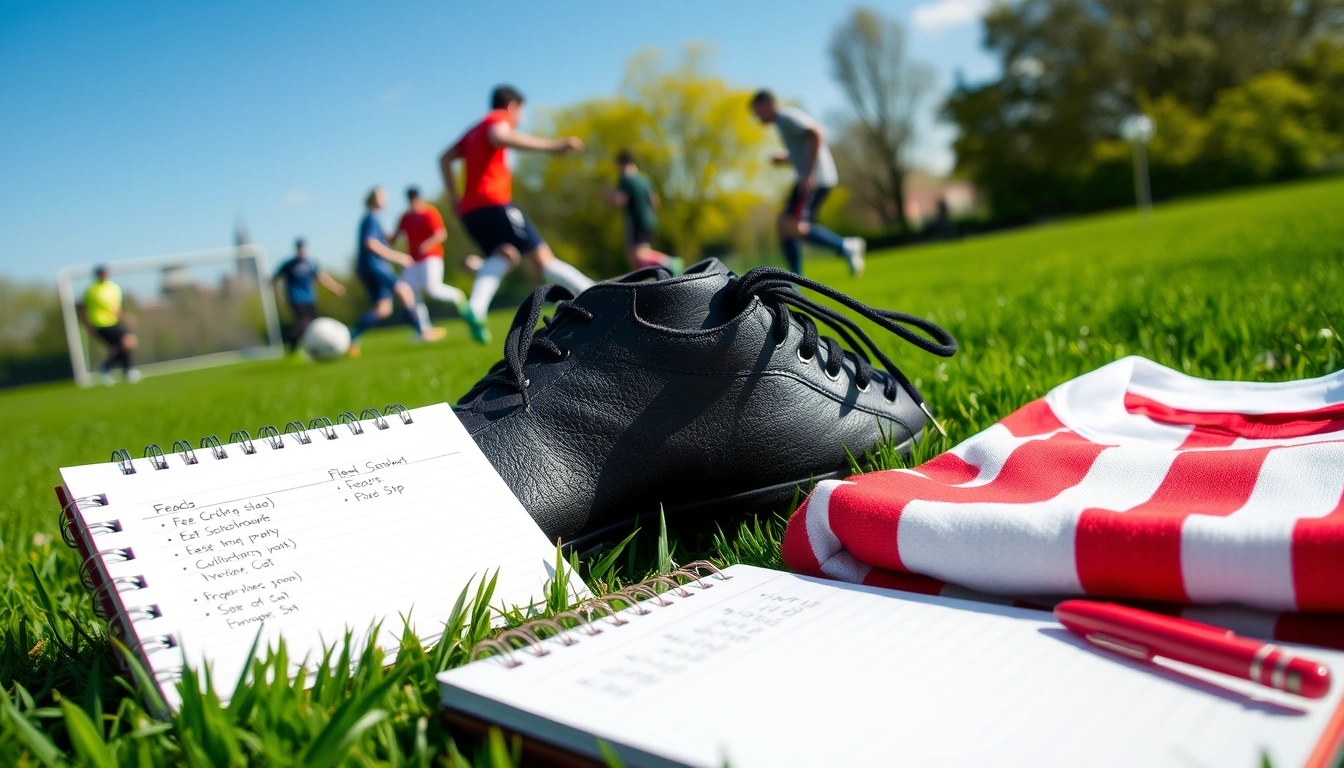So, you’ve decided to get off the couch and actually play some football on a Sunday in London? Brilliant! But before you start picturing yourself scoring the winning goal in front of a roaring crowd (okay, maybe just a few mates with pints), let’s get real about what it takes to join a Sunday league team. It’s not always as straightforward as just turning up with your boots and swagger. Here’s a no-nonsense guide, sprinkled with some cheeky tips, to help you find your place on the pitch.
Understanding Sunday League Football in London
First off, Sunday league football isn’t the Premier League — and that’s the charm. It’s a mix of passionate players, weekend warriors, and the occasional bloke who just fancies a kickabout after a heavy Saturday night. The vibe? Rough around the edges, competitive but fun, and sometimes chaotic (hello, muddy pitches and questionable refereeing). It’s grassroots football at its finest, where the love of the game often outweighs the skills on display.
Expect everything from serious semi-pro types to lads who can barely tell a corner kick from a throw-in. The culture is diverse, and the social side is just as important as the action on the pitch.
Where to Find Sunday League Teams
Now, finding a team isn’t as simple as just walking into a pub and shouting “I wanna play!” (although that might work in some places). Here are some top ways to track down teams looking for players:
- Online Platforms: Websites like Pulse Live or Meetup often list teams and open trials.
- Local Football Hubs: Parks, community centres, and sports clubs are goldmines for spotting teams recruiting.
- Word of Mouth: Ask mates, colleagues, or even your local corner shop. Sometimes the best teams are the ones you stumble upon.
| Method | Pros | Cons |
|---|---|---|
| Online Platforms | Wide reach, easy to browse | Can be overwhelming, some outdated listings |
| Local Football Hubs | Face-to-face, immediate feedback | Time-consuming, limited options |
| Word of Mouth | Trusted recommendations | Depends on your network |
How to Assess Your Skill Level
Not everyone’s lining up for a Premier League trial, and that’s okay. Be honest with yourself — are you the casual kickabout kind, or do you fancy a bit of competition? Here’s a quick checklist to figure it out:
- Can you keep up for 90 minutes without gasping like a fish?
- Do you understand the basic rules, or do you often get confused about offside?
- Are you okay with getting muddy and possibly a bit bruised?
If you answered “no” to most, maybe start with a social team or a beginners’ group. If you’re nodding “yes” confidently, then a semi-serious squad might be your jam.
Contacting Teams: Dos and Don’ts
Sliding into a team’s DMs or sending an email might feel awkward, but it’s all about the approach. Don’t be that guy who sends a message like “pls let me play, I’m gud lol.” Instead, try something like:
Hi [Team Name],I’m interested in joining your Sunday league team. I’ve played casually for a while and am keen to get involved. Could you let me know if you’re currently looking for players or when trials might be?Thanks,[Your Name]
Keep it polite, short, and show some enthusiasm without sounding desperate. And please, don’t bombard them with messages if they don’t reply immediately — patience is a virtue!
In the next sections, we’ll dive into what to expect at trials, the costs involved (spoiler: it’s rarely free), essential gear, and more. But for now, just remember: Sunday league football in London is as much about the craic as it is about the game. So lace up, get out there, and don’t take yourself too seriously!
Understanding Sunday League Football in London
If you think Sunday league football in London is just a bunch of blokes kicking a ball about in a park, well, you’re partly right — but it’s so much more than that. It’s a vibrant, chaotic, and often hilarious slice of grassroots football culture that’s as competitive as it is fun. Imagine a melting pot where ambition meets banter, where the occasional dive or cheeky nutmeg is met with groans and laughter in equal measure. London’s Sunday leagues aren’t just about the game; they’re about the community, the characters, and the unpredictable moments that make grassroots football uniquely addictive.
Now, don’t get me wrong, it’s not all just a laugh. There’s a surprising level of competitiveness too. Some teams treat Sunday matches like their own mini Premier League — training midweek, analysing tactics (yes, really), and turning up with kits that look like they’ve been sponsored by a pro club. Then there are the teams who show up for the love of the game, or the post-match pints, whichever comes first. The beauty of Sunday league in London is that it caters to everyone — from the casual kickabout crew to those who take their football dead seriously.
- Culture: Expect a mix of players from all walks of life and backgrounds. London’s diversity shines here.
- Competitiveness: It varies wildly but don’t be fooled — some matches feel like cup finals.
- Fun Chaos: From last-minute venue changes to referees who might be a mate of the captain, unpredictability is the norm.
Here’s a quick table to give you a flavour of what to expect on any given Sunday:
| Aspect | Typical Sunday League Reality | Pro Tip |
|---|---|---|
| Match Punctuality | Starts anywhere between 10-20 minutes late. Don’t be that guy who’s five minutes early and looks awkward. | Use the extra time to warm up and chat with teammates. |
| Refereeing | Usually a volunteer, sometimes a mate. Expect some questionable calls and a lot of banter. | Keep calm and don’t argue too much — it’s all part of the game. |
| Pitch Quality | From decent grass fields to muddy patches that make you question your life choices. | Invest in decent boots with good grip; you’ll thank yourself later. |
One thing that often surprises newcomers is just how social Sunday league football is. Sure, the game itself is the main event, but the post-match banter and the occasional team BBQ or pub meet-up are just as important. It’s where friendships are forged, rivalries start, and the real spirit of Sunday league football lives.
But don’t be fooled by the jovial atmosphere — the passion runs deep. You’ll find players who’ve been in the league for years, some who’ve had brushes with semi-pro football, and others who just love the camaraderie and competition. It’s this mix that gives London’s Sunday leagues their unique flavour.
So, before you lace up those boots and jump into the fray, remember that Sunday league football here is not just a sport; it’s a culture — messy, unpredictable, and utterly brilliant. Embrace the chaos, expect the unexpected, and most importantly, have fun.
Where to Find Sunday League Teams
So, you’ve decided to dive into the chaotic, muddy world of Sunday league football in London — brilliant choice! But here’s the kicker: finding a team isn’t as straightforward as just turning up at the local park and hoping someone hands you a jersey. Nope, it’s a bit more of a treasure hunt, and sometimes you’ve got to know where to look (and who to annoy) to get that golden invite.
First off, local parks and community centers are classic spots. Think of places like Hackney Marshes or Clapham Common — these sprawling green spaces are buzzing with Sunday league activity. Teams often post flyers on noticeboards or chat with players after matches. It’s old-school but effective. If you’re feeling brave, just wander over after a game and ask around. Sometimes, it’s less about formal tryouts and more about showing you’re keen (and can run without falling over).
| Park | Location | Known For |
|---|---|---|
| Hackney Marshes | East London | Largest Sunday league hub in Europe |
| Clapham Common | South West London | Vibrant community teams and casual kickabouts |
| Victoria Park | East London | Mixed skill levels, social atmosphere |
Next up, the internet is your mate here. Websites like sundayleague.co.uk or footballinlondon.com list teams looking for players. These platforms can be a godsend if you’re shy or just hate face-to-face awkwardness. They usually have forums, player ads, and sometimes even reviews of teams (because yes, some Sunday league squads can be a bit… erm, “interesting”).
- Tip: When contacting teams online, be honest about your skill level. No one wants a “baller” who can’t pass to save their life.
- Pro tip: Join Facebook groups dedicated to London Sunday league football. They’re buzzing with posts about trials, vacancies, and even gear swaps.
Another often overlooked route is local pubs. Yeah, it sounds cliché, but many Sunday league teams are born and bred in the pub scene. Places near football grounds or parks often have noticeboards or just regulars who know who’s looking for players. If you’re friendly and can handle a pint or two, you might just find yourself invited to a training session.
Finally, don’t underestimate word of mouth. Tell your mates, colleagues, or even randoms you meet at the gym that you want to play Sunday league. You’d be surprised how often teams need players last minute due to injuries or no-shows. Sometimes, it’s about being in the right place at the right time and having the right mates to call.
Summary Checklist for Finding Sunday League Teams:- Visit local parks & community centers (Hackney Marshes, Clapham Common)- Use dedicated football websites & forums- Join Facebook groups for London Sunday league players- Check out local pubs near football hubs- Spread the word among friends and acquaintances
Remember, Sunday league football is as much about the social side as the game itself — so getting in is half the battle, but sticking around is where the real fun begins. And if you don’t get picked straight away? Don’t sweat it. Keep showing up, keep chatting, and maybe one day you’ll be the one recruiting the next new player.

How to Assess Your Skill Level
Alright, let’s get real for a moment — not everyone stepping onto the Sunday league pitch is a budding Messi or a Premier League star in disguise. And honestly, that’s perfectly okay! The key to enjoying your Sunday football experience (without embarrassing yourself or getting benched every week) is knowing exactly where you stand skill-wise. So, how do you figure that out without the ego getting in the way? Let’s break it down.
- Be Honest With Yourself: Sounds simple, but you’d be surprised how many people overestimate their abilities after watching a few highlight reels on YouTube. Can you dribble past a defender without looking like you’ve got two left feet? Do you actually know where the goal is? If the answer’s shaky, you might want to start with a team that’s more about having a laugh than winning trophies.
- Ask Around: Sometimes your mates or even your local coach can give you the reality check you need. They’ll tell you if you’re the next big thing or if you’re better off sticking to kickabouts in the park.
| Skill Level | Description | Recommended Team Type |
|---|---|---|
| Beginner | Still figuring out basic ball control, passing, and positioning. May struggle with fitness or game understanding. | Casual teams, social kickabouts, or clubs focused on fun and learning. |
| Intermediate | Comfortable with the ball, decent fitness, understands tactics but inconsistent under pressure. | Mid-level Sunday league teams with moderate competitiveness. |
| Advanced | Good technical skills, tactical awareness, and fitness. Can hold their own in competitive matches. | Semi-serious squads aiming for league titles or cup runs. |
Don’t get caught up thinking you have to be a football genius to join a team. Sunday league is as much about having a laugh and meeting new people as it is about winning. If you’re a beginner, look for teams that welcome rookies — they’ll appreciate your honesty and probably help you improve without making you feel like a total muppet.
Here’s a quick checklist you can use to self-assess before you start reaching out to teams:
- Can you control the ball without tripping over it?
- Do you know basic positions and roles on the pitch?
- Are you fit enough to run for 90 minutes (or close to it)?
- Can you pass accurately to teammates?
- Do you understand offside and other basic rules?
If you’re nodding “yes” to most of those, you’re probably ready for a team that takes things a bit more seriously. If not, no worries — there’s a perfect Sunday league team out there for every skill level, from “just here for the banter” to “trying to win the league.”
Remember, the goal isn’t to be perfect right off the bat. It’s about finding a team where you fit in, can have fun, and maybe even improve your game over time. So, take a deep breath, be honest with yourself, and get ready to enjoy some proper Sunday football action.
Contacting Teams: Dos and Don’ts
So, you’ve decided to jump into the Sunday league football scene in London — brilliant! But here’s the kicker: actually getting in touch with teams without sounding like you’re begging for a spot or, worse, coming off as clueless, is a bit of an art form. Trust me, it’s not as straightforward as shooting off a quick message or dialing up a captain on a whim.
- Do your homework first. Before you even think about sliding into those DMs or picking up the phone, find out a bit about the team. What’s their vibe? Are they super competitive or more about the banter and beers after? Nothing screams “I don’t care” like a generic “Hey, can I play?” message.
- Don’t spam. It’s tempting to message every team you find on Facebook or WhatsApp groups, but resist the urge. Quality over quantity here. Pick a few teams that actually seem like a good fit and focus your energy there.
Look, sliding into DMs can work if done right. Keep it casual but respectful — something like, “Hi, I’m looking to join a Sunday league team around London. Saw your page and wondered if you’re looking for players this season?” Easy, breezy, and not desperate. Avoid the long essay about your life story or how you scored a hat-trick in your backyard last weekend. Save that for the trial day.
| Do’s | Don’ts |
|---|---|
| Be polite and concise | Send multiple messages if no reply |
| Show genuine interest in the team | Use slang or overly casual language |
| Ask clear questions about trials or availability | Demand a spot or guarantee |
| Follow up politely after a week if no response | Get aggressive or impatient |
Now, about those old-school calls — some teams still prefer a proper phone chat. If you’re dialing up, have a quick intro ready but don’t sound like you’re reading off a script. A little nervousness? Fine, we all get that. But don’t ramble on about your football dreams for 10 minutes. Keep it to the point: who you are, where you found them, and what you’re after.
- Do ask when the next training or trial session is.
- Don’t call at odd hours — evenings after work or early weekends are usually best.
- Do thank them for their time, even if they say no.
Here’s a quick practical tip: keep a little notebook or note on your phone with team names, contacts, dates you messaged, and any replies. It helps you stay organised and avoid embarrassing yourself by reaching out twice to the same team in one day.
Remember, joining a Sunday league team is as much about fitting in socially as it is about football skills. So, when you do get through, show a bit of personality — but don’t overdo it. Nobody wants the guy who’s too eager or, worse, the one who’s clueless about the basics.
In short, be cool, be clear, and don’t be that desperate bloke. Slide in with confidence, not desperation. And if one team says no? Brush it off and try another. It’s all part of the game.
Trial Days and What to Expect
So, you’ve found a Sunday league team in London that sounds like your kind of crew, and now comes the big moment: the trial day. Don’t panic just yet — these sessions might sound intimidating, but they’re usually a bit more laid-back than you’d expect. Most Sunday league trials aren’t some high-pressure, professional-style auditions. Instead, they’re often just a chance for the team to see how you play, how you get on with others, and whether you’d fit into their football family. Think of it as a casual meet-up with a football twist.
- Warm-up and Introductions: Usually, the trial kicks off with some light warm-ups — jogging, stretches, maybe some passing drills. It’s the perfect time to shake off nerves and get a feel for the vibe. Coaches or captains will likely introduce themselves and explain what they’re looking for.
- Small-sided Games: Expect to be thrown into 5-a-side or 7-a-side games rather than a full 11-a-side match. These smaller games let the coaches see your skills, teamwork, and attitude up close.
- Position Testing: Don’t be surprised if they ask you to try different positions. Sunday league teams value versatility, so showing you can adapt might just tip the scales in your favor.
| What Happens | What You Should Do |
|---|---|
| Warm-up drills and passing exercises | Stay loose, focus on your touch, and don’t rush. Show you’re engaged. |
| Small-sided matches | Play smart, communicate, and don’t hog the ball. Teamwork counts. |
| Chat with the coach/captain | Be honest about your experience and what you want from the team. |
Now, about keeping your cool — easier said than done, right? It’s natural to feel nervous, but try to remember that Sunday league is all about having fun and enjoying the game. If you mess up a pass or miss a shot, shrug it off and keep going. Coaches appreciate players who stay positive and keep their head in the game, even when things aren’t perfect. And hey, if you find yourself freezing or overthinking, just focus on the basics: good positioning, passing simple, and supporting your teammates.
A little heads-up: some teams are more formal with their trials, maybe even having a set time and place with other hopefuls turning up. Others might be more informal — a quick message to the captain, then a casual kick-around at the park. Either way, it’s smart to ask beforehand what to expect so you’re not caught off guard.
Tips for Trial Day:- Bring your own kit and boots, just in case.- Arrive early to get settled and meet the team.- Stay hydrated and maybe bring a snack.- Don’t be afraid to ask questions about training and match days.- Show enthusiasm — sometimes attitude beats skill.
At the end of the day, trials are as much about you figuring out if the team feels right as it is about them seeing what you can do. So, relax, give it your best shot, and remember — every player started somewhere, and Sunday league is all about the love of the game, not just winning trophies. If it doesn’t work out, no worries, there’s plenty more teams and pitches in London waiting for you. Lace-up, show up, and enjoy the beautiful game.

Costs and Commitments Involved
So, you’re thinking about diving into Sunday league football in London? Well, hold your horses before you imagine it’s all free kicks and banter on the pitch. Spoiler alert: Sunday league isn’t exactly a free-for-all, and sometimes it’ll pinch your wallet more than you expect. Let’s break down what you’re really signing up for, money-wise and time-wise, so you don’t get caught off guard like a defender caught napping.
First off, joining a Sunday league team usually involves fees. These aren’t just random charges; they cover pitch hire, referees, league registration, and sometimes even a post-match pint (well, that last one depends on your team’s culture). Expect to pay somewhere between £30 to £70 per season, but beware: some leagues or teams might push that higher, especially if the facilities are fancy or the league is more competitive. And no, you won’t always get a shiny jersey handed to you for free — some teams ask players to chip in for kit or training tops.
| Typical Expense | Estimated Cost | Notes |
|---|---|---|
| League Registration Fee | £20 – £40 | Varies by league, usually annual |
| Pitch Hire | £10 – £30 per match | Often split between players |
| Kit and Gear | £30 – £100+ | Depends on quality and brand |
| Referee Fees | £10 – £20 per match | Usually included in pitch hire but sometimes separate |
Gear costs can sneak up on you too. Sure, you don’t need the latest Nike Mercurials to smash it on the park, but you’ll want at least a decent pair of boots, shin pads, and a few pairs of socks. And if you’re the type who likes to look sharp, a full kit set (jersey, shorts, socks) can set you back a fair chunk. Don’t forget weather-appropriate clothing — London’s weather is about as predictable as a last-minute penalty.
Now, about the time commitment. Sunday league might sound casual, but it’s more than just turning up on game day. Training sessions (if your team does them) usually happen once or twice a week, often in the evenings. Add match day itself, which can take up most of your Sunday morning or afternoon. Plus, there’s the social side — team meet-ups, post-match pints, and the occasional charity tournament. If you’re juggling work, family, or a social life, this can be a juggling act.
- Match Day: Typically Sunday mornings or afternoons, lasting 90 minutes plus warm-up and cool-down.
- Training: 1-2 evenings per week, usually 1.5 hours each.
- Travel Time: Factor in getting to and from the pitch, which in London traffic can be a nightmare.
In short, Sunday league football is a commitment — financially and time-wise. But if you’re cool with that, it’s a damn good way to stay fit, meet mates, and play the beautiful game in a lively, grassroots setting. Just don’t be that guy who shows up expecting everything to be free and easy — because, mate, it’s not. But hey, if you love the game, it’s worth every penny and minute.
Essential Gear for Sunday League Football
Alright, let’s get real for a moment — Sunday league football isn’t about flashy sponsorships or the latest top-tier boots you see on TV. If you’re stepping onto a muddy pitch somewhere in London on a Sunday morning, you don’t need to look like you just walked out of a pro shop catalogue. But don’t get me wrong, there’s a minimum you absolutely need to avoid looking like a total muppet or, worse, getting injured. So, forget the fancy boots if you want, but here’s the bare minimum kit you’ll need to survive and maybe even impress on the pitch.
- Boots: Yes, you do need boots. No, they don’t have to be the latest Nike Mercurial or Adidas Predator. A decent pair of firm ground boots will do just fine. If you’re playing on grass, avoid trainers at all costs — slipping and sliding is no fun, and you’ll be the butt of every joke. If you’re on an artificial pitch, then get boots with rubber studs. Cheap options from sports stores or even second-hand boots are perfectly acceptable.
- Shin Pads: This is non-negotiable. You might think Sunday league is all fun and games, but a stray kick or tackle can hurt like hell. Shin pads don’t have to be bulky or expensive, but they must cover your shins properly. No one wants to see you hobbling off after a clumsy challenge.
- Socks: Long football socks that cover your shin pads are essential. They keep everything in place and stop your legs from looking like a patchwork quilt after a game. Plus, they add a bit of colour and team spirit.
| Item | Purpose | Approximate Cost |
|---|---|---|
| Football Boots | Traction and performance on grass or artificial turf | £20 – £80 |
| Shin Pads | Protection from tackles and kicks | £5 – £25 |
| Football Socks | Cover shin pads and comfort | £3 – £10 |
| Comfortable Shorts | Freedom of movement | £5 – £20 |
| Basic Training Top or Jersey | Team identification and breathability | £10 – £30 |
Now, before you start thinking you’re sorted with just boots, shin pads, and socks, remember that Sunday league is a mixed bag. Sometimes you’ll rock up and the team might have a kit, sometimes you’ll just wear whatever you have. So, it’s smart to have a couple of comfortable shorts and a breathable top — nothing fancy, just something that won’t chafe or weigh you down. Cotton tees are a no-go; they get heavy and soggy with sweat faster than you can say “goal.”
Oh, and one more thing — a water bottle. Sounds obvious, but you’d be surprised how many people forget this. Hydration is key, especially if the weather decides to be a proper pain with a scorching sun or a sudden downpour.
- Optional but handy: A pair of gloves if you’re a keeper, some tape for ankles if you’re injury-prone, and a lightweight jacket for post-match chilling.
In the end, Sunday league is more about the spirit than the kit. But having the right gear means you can focus on playing without worrying about slipping, bruising, or looking like you wandered off a casual jog instead of a football pitch. So, keep it simple, keep it practical, and most importantly, keep it fun.
Quick checklist before you head out:
- Boots (not trainers!)
- Shin pads
- Long socks
- Comfortable shorts
- Breathable top
- Water bottle
- Optional: Gloves, tape, jacket
Now go on, get out there and show them what you’ve got — mud, sweat, and all!
Understanding the Rules and Etiquette
Sunday league football in London isn’t just about what’s written in the official rulebook — it’s got its own set of unwritten rules and social codes that can make or break your experience on the pitch. If you’re new to the scene, brace yourself: knowing these little quirks can save you from some seriously awkward moments, like being that player who doesn’t quite get the vibe or worse, the one everyone side-eyes after the game.
First off, the official laws of the game are mostly followed, but Sunday league refs (bless ‘em) aren’t always sticklers for every single detail. Expect some leniency, some arguments, and a fair bit of “let’s just get on with it” attitude. But here’s the catch — some things are *super* important, even if they’re not in the rulebook. For example, respecting the ref’s decisions is huge. You might think you’re right about that offside, but losing your cool and shouting at the ref? Instant social exile. It’s not the Premier League, but it’s still football, and respect counts.
- Handshake before and after the game: It’s not just polite, it’s expected. Skipping this? You’re basically saying you don’t care about sportsmanship.
- Don’t dive: Everyone hates a diver. The Sunday league is brutal enough without players theatrically flopping around like they’re in the World Cup final.
- Own up to fouls: If you’ve done something dodgy, admit it. The lads appreciate honesty over sneaky play.
Now, here’s where it gets a bit quirky. Sunday league teams often have their own team culture and inside jokes. For instance, showing up late might be forgiven once, but if you’re consistently late, expect some ribbing or even being benched. And no, turning up with flashy boots doesn’t automatically make you the star — sometimes it just paints a target on your back for some extra rough tackles.
| Common Unwritten Rules | Why It Matters |
|---|---|
| Don’t hog the ball | Football’s a team game, mate. Pass it around or you’ll get the cold shoulder. |
| Help out the weaker players | Sunday league is about fun and community, not just scoring goals. |
| Bring your own kit | Teams rarely provide gear, so come prepared or risk looking like a muppet. |
One golden rule that often gets overlooked: the post-match pint. Whether you win or lose, joining the team for a drink afterwards is almost sacred. It’s where friendships are forged, banter flows, and the day’s dramas get hashed out. Skip the pub and you might as well have skipped the game.
In short, Sunday league football is a beautiful mess of rules, etiquette, and camaraderie. It’s less about perfection and more about showing up, having a laugh, and respecting the game and the people who play it. Nail that balance, and you’ll not only avoid awkwardness but might actually enjoy yourself — who knew?

Common Challenges New Players Face
Joining a Sunday league football team in London might sound like a straightforward idea — just show up, kick a ball around, and make some mates, right? Well, not exactly. If you’re stepping onto the pitch for the first time, be ready for a few bumps along the way. From feeling like the odd one out to navigating the quirks of over-competitive teammates, the journey isn’t always a walk in the park.
First off, being the newbie is a challenge in itself. Everyone’s got their clique, their inside jokes, and their preferred way of playing. You’ll often find yourself on the sidelines, trying to figure out who’s who and what the hell is going on. It’s like joining a secret club where the password is a mix of football slang and banter. Don’t get disheartened if you’re not immediately handed the ball or if the team seems a bit distant at first — it’s normal.
- Pro Tip: Show up early, get involved in warm-ups, and try to remember names. It makes a world of difference.
- Another thing: Don’t be afraid to ask questions. It’s better to look a little clueless than to mess up the play.
Then there’s the issue of over-competitive teammates. Sunday league football is supposed to be fun, but some players treat it like the Premier League final. You know the type — the ones who argue over every foul, boss everyone around, and take themselves way too seriously. It can be intimidating, or worse, frustrating if you’re just there to enjoy a casual game.
| Challenge | What It Looks Like | How to Handle It |
|---|---|---|
| Being the Newbie | Feeling left out, unsure of team dynamics | Arrive early, engage in warm-ups, ask questions |
| Over-Competitive Teammates | Players arguing, bossing others, high tension | Stay calm, focus on your game, avoid confrontations |
| Skill Level Mismatch | Feeling out of place, either too good or too bad | Be honest about your ability, seek suitable teams |
Oh, and let’s not forget the skill level mismatch — a classic rookie trap. Sometimes you join a team only to realize you’re either miles ahead or hopelessly out of your depth. It’s awkward, but it happens. The key is to be honest with yourself and the team about where you’re at. If you’re too good, you might bore the others; too inexperienced, and you risk being a liability on the pitch.
- Don’t pretend you’re Messi if you’re not — trust me, it’ll only backfire.
- Look for teams that match your vibe: some are all about casual kickabouts, others want serious wins.
Finally, there’s the communication chaos. Sunday league teams often rely on WhatsApp groups or last-minute texts to organize matches, and if you’re not glued to your phone, you might miss out. Plus, sometimes instructions come with a side of sarcasm or inside jokes that can leave you scratching your head.
In short, joining a Sunday league team isn’t just about football skills — it’s about patience, adaptability, and a good sense of humor. Embrace the awkward moments, the friendly rivalries, and the occasional chaos. After all, that’s part of what makes Sunday league football in London so uniquely brilliant.
Benefits of Playing Sunday League Football
Alright, let’s get real for a moment. Sunday league football isn’t just about smashing the ball into the net or bragging rights after a cheeky win. Sure, scoring goals and tasting that glory is a massive part of it, but if you think that’s all there is, you’re missing the bigger picture — the unexpected perks that make Sunday league football a proper life-changer for many.
First off, the social side of things is an absolute gem. You’re not just joining a team; you’re stepping into a mini-community. Whether it’s the post-match banter over a pint or the random group chats filled with memes and match updates, Sunday league football can seriously boost your social life. For many, it’s the highlight of the week where friendships are forged, and the usual weekday grind gets a break. Plus, it’s a great way to meet people from all walks of life, which, let’s be honest, you might not get to do otherwise.
| Benefit | Why It Matters | Real-World Example |
|---|---|---|
| Social Connections | Builds friendships, expands your network, and boosts mental health. | Players often hang out post-game, forming tight-knit groups beyond the pitch. |
| Fitness | Improves cardiovascular health, strength, and overall stamina. | Regular training and matches keep you active and in better shape. |
| Stress Relief | Physical activity releases endorphins, reducing stress and anxiety. | Many players find Sunday games a perfect escape from work pressures. |
Speaking of fitness, don’t underestimate how much just a couple of hours chasing a ball around can do for your body. It’s not about being a pro athlete; it’s about getting out, moving, and feeling alive. The rush of sprinting down the wing or making that last-ditch tackle? Priceless. You’ll notice your energy levels spike, and even if you’re a bit rusty, the gradual improvement feels like a win in itself.
And here’s the kicker — stress relief. Life in London can be a bit of a beast, right? Work deadlines, noisy commutes, endless emails. Sunday league football is like pressing the reset button. That hour or two on the pitch lets you forget about all the nonsense, focus on the game, and just have fun. The physical exertion helps clear your head, and the camaraderie means you’re not alone in the chaos.
- Improved Mental Health: Being part of a team can reduce feelings of isolation.
- Discipline and Routine: Regular matches and training help structure your weekends.
- Confidence Boost: Scoring a goal or nailing a pass can do wonders for self-esteem.
But hey, it’s not all sunshine and rainbows. Sometimes the team drama, the odd injury, or that one mate who never passes the ball can test your patience. Yet, even these little challenges add to the experience, teaching resilience and teamwork in a way no gym session ever will.
So, if you’re thinking about dipping your toes into Sunday league football, don’t just see it as a sport — see it as a lifestyle upgrade. It’s about the laughs, the sweat, the friendships, and yes, the odd victory dance when you finally score that goal. And trust me, once you’re in, you’ll wonder why you didn’t join sooner.
How to Improve and Stand Out
So, you’ve been showing up every Sunday, lacing up your boots, and giving it your all on the pitch. But let’s be honest—being “that guy who just turned up” isn’t exactly the legacy you want to leave behind, right? If you’re aiming to sharpen your game and maybe even catch the eye of those bigger clubs lurking in the shadows, here’s some down-to-earth advice that doesn’t involve magic or overnight miracles.
- Master the basics—then some: You’d be surprised how many players skip the fundamentals and dive straight into flashy stuff. Passing, positioning, and reading the game are your bread and butter. Nail those first. Work on your first touch like it’s your job (because, well, it kinda is on Sundays). And don’t forget your weak foot! It’s tempting to only use your stronger side, but versatility makes you less predictable.
- Watch and learn: No, you don’t have to binge-watch Premier League games religiously, but paying attention to how players move off the ball, communicate, and anticipate plays can be a game changer. Even YouTube tutorials or Sunday league highlight reels can teach you a thing or two.
Now, here comes the fun part—standing out without looking like you’re trying too hard. There’s a fine line between confidence and cockiness. You want to be the player who makes things happen, not the one who hogs the ball or argues with every decision. Here’s a quick table to help you keep that balance:
| Do | Don’t |
|---|---|
| Communicate clearly and positively | Shout at teammates or refs |
| Support your team both on and off the pitch | Isolate yourself or be a loner |
| Show hustle and commitment | Give up after one bad game |
| Be coachable and open to feedback | Ignore advice and keep doing your own thing |
Another nifty trick? Fitness and stamina. Sunday league games can be brutal, especially if you’re not used to running up and down for 90 minutes. If you want to stand out, being the guy who keeps going when others are gasping for air is a massive plus. Try sneaking in some cardio during the week—jogging, cycling, or even those dreaded HIIT sessions (yeah, we know, pain).
- Practice set pieces: Free kicks, corners, penalties—they’re your chance to shine. Even if your team doesn’t have a designated taker, stepping up confidently can get you noticed.
- Work on your mental game: Sunday league isn’t just physical; it’s a rollercoaster of emotions. Stay calm under pressure, don’t let mistakes shake you, and keep your head in the game. Mental toughness separates the good from the great.
Lastly, don’t underestimate the power of networking. Chat with teammates, managers, and even opponents. Sometimes, it’s who you know as much as what you do on the pitch. If a bigger club spots your attitude and dedication, that’s half the battle won.
So yeah, it’s not rocket science, but it’s definitely not a walk in the park either. Keep grinding, stay humble, and who knows? Maybe next season, you’ll be the one other players whisper about as the guy who went from “just there” to “the one to watch.”

When to Move On or Try a Different Team
Alright, so you’ve been kicking it with your Sunday league team for a bit, but something feels off. Maybe the vibe’s not quite right, or you’re just not getting the game time you hoped for. It happens — not every team is a perfect fit, and that’s okay. The tricky bit? Figuring out when to stick it out and when it’s time to dust off those boots and look elsewhere. Here’s the lowdown.
First up, patience is a virtue — but only to a point. Every team has its ups and downs: a bad run of form, some personality clashes, or just that awkward newbie phase where you’re still finding your feet. If you’re generally enjoying the banter, getting some minutes on the pitch, and feeling like you’re improving, it might be worth hanging around. Rome wasn’t built in a day, and neither are Sunday league legends.
- Signs to stick it out:
- You feel welcomed by teammates, even if the banter’s a bit rough.
- Coach or captain gives you honest feedback and chances to improve.
- You’re learning and having fun, even if you’re not scoring hat-tricks.
But, if you’re constantly benched, ignored, or worse — feeling like the odd one out — that’s a red flag waving. Sunday league is meant to be fun, a bit competitive sure, but mostly about enjoying the game. If you dread the matchday texts or the warm-ups feel like a chore, it’s time to rethink.
| Issue | What It Means | Possible Action |
|---|---|---|
| Consistently no game time | Coach doesn’t see you fitting into the team | Ask for feedback; if no improvement, seek another team |
| Team culture feels toxic | Unfriendly environment, cliques, or bad attitudes | Consider moving; mental health matters |
| Lack of commitment from teammates | Players don’t show up or take it seriously | Find a team with better dedication |
Another thing to keep in mind: sometimes it’s not you, it’s them. Maybe the team’s style doesn’t suit your play, or the social dynamics are just a bit off. Don’t take it personally. London’s Sunday leagues are massive, with squads for every kind of player — from casual kickabouts to those who treat it like their second job.
If you decide to move on, don’t ghost your current team. A quick heads-up or a chat with the captain goes a long way. It’s a small world, and you never know when paths will cross again — maybe even as opponents!
- Tips for trying a new team:
- Attend trial sessions with an open mind, but keep your standards.
- Don’t be afraid to ask about the team’s culture and expectations upfront.
- Remember, it’s about finding a place where you feel you belong.
At the end of the day, Sunday league football is about enjoying the beautiful game without the pressure cooker of professional play. If your current team isn’t hitting the mark, it’s perfectly fine to explore other options. Your boots deserve a pitch where you’re valued, challenged, and, most importantly, having a laugh.
Frequently Asked Questions (The title must be written in English.)
- What exactly is Sunday league football in London?
Sunday league football is a grassroots, community-driven football scene where players of all skill levels come together to enjoy the beautiful game on weekends. It’s less about professional glory and more about fun, fitness, and forging friendships in a lively, competitive environment.
- How do I find a Sunday league team to join?
Finding a team isn’t just about showing up at a pitch. Check local football forums, social media groups, and websites dedicated to Sunday leagues. Also, pubs and community centers around London often have noticeboards or word-of-mouth tips. Don’t be shy—reach out and express your interest!
- How can I honestly assess my football skill level?
Think of your skill level like a spice level on a menu—mild, medium, or hot. Be honest about your abilities by reflecting on your past playing experience, fitness, and comfort on the ball. This helps you find a team that matches your vibe, whether casual or competitive.
- What’s the best way to contact teams without sounding desperate?
Keep it casual and polite. A short, friendly message introducing yourself and your interest works wonders. Avoid bombarding them with messages; patience and respect go a long way in making a good impression.
- What should I expect during a trial day?
Trials can be informal or structured—expect drills, some friendly scrimmages, and a chance to show your attitude as much as your skills. Stay relaxed, play hard, and don’t stress over perfection. Remember, teams want players who fit in well.
- Are there costs involved in joining a Sunday league team?
Yes, there usually are. Expect to pay a registration fee, pitch hire, and sometimes kit costs. It’s like investing in your weekend fun and fitness, so budget accordingly to avoid surprises.
- What gear do I absolutely need?
At minimum, bring sturdy boots, shin pads, and comfortable sportswear. You don’t need flashy boots—think practical and durable. A water bottle and a positive attitude are must-haves too!
- Are there unwritten rules or etiquette I should know?
Definitely! Respect the ref, support your teammates, and keep the competitive spirit friendly. Sunday league thrives on good vibes, so avoid diving into drama and keep things light-hearted.
- What challenges might I face as a new player?
Being the newbie can be daunting—expect to prove yourself on and off the pitch. You might face over-competitive teammates or cliques. Stick with it, stay humble, and let your passion speak louder than nerves.
- What benefits come from playing Sunday league football?
Beyond scoring goals, expect better fitness, a richer social life, and a great stress outlet. It’s like a weekly reset button that boosts both body and mind.
- How can I improve and stand out in my team?
Show up consistently, listen to feedback, and practice your skills outside games. Being reliable and positive often shines brighter than just raw talent—think of yourself as the glue that holds the team together.
- When should I consider moving to a different team?
If you’re not enjoying the vibe, feeling undervalued, or the commitment clashes with your life, it’s okay to look elsewhere. Sunday league football should be fun, not a chore—don’t hesitate to find your perfect fit.













